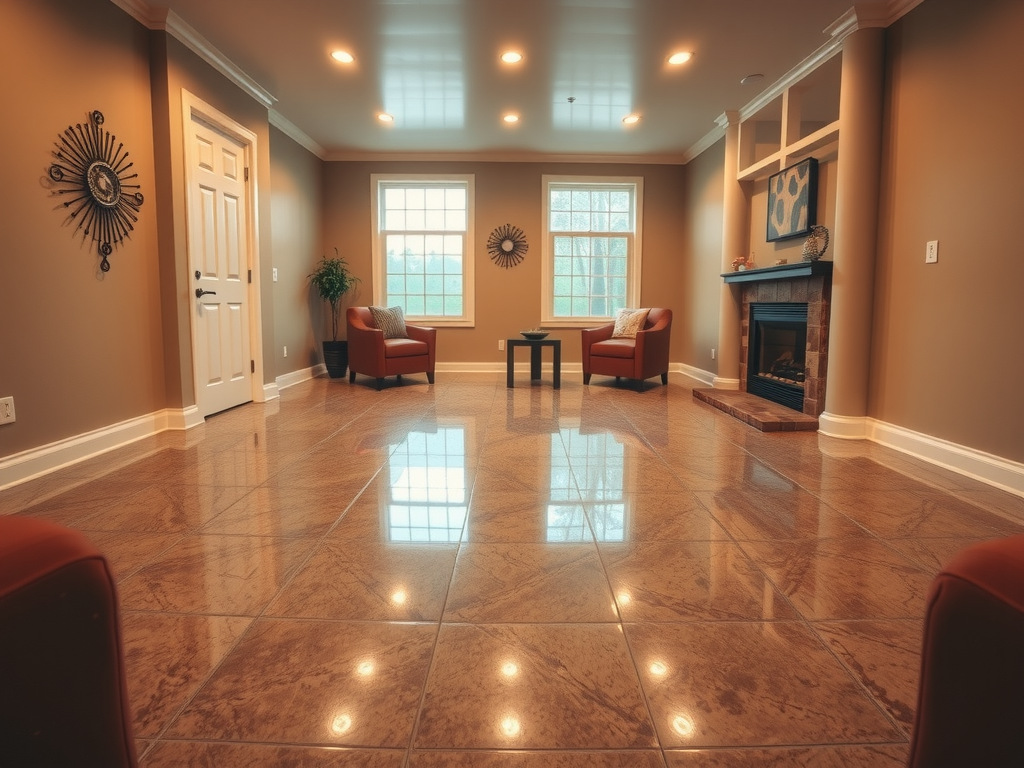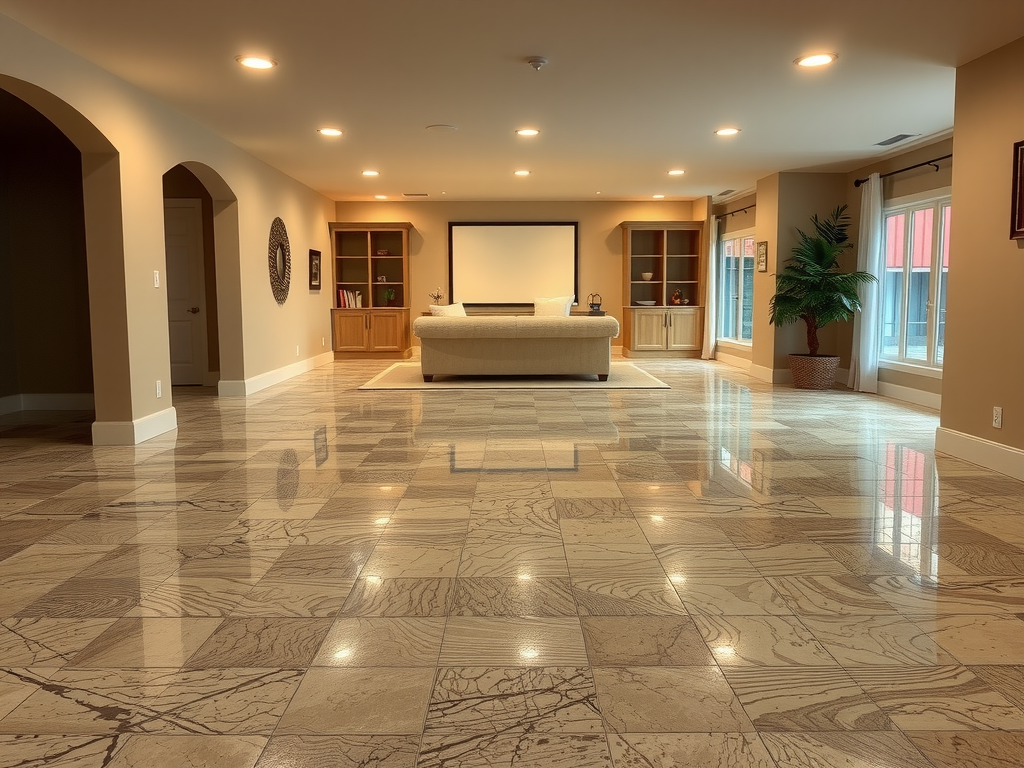
Click here to learn more about: amarilloepoxyservices.com
Why Choose Epoxy Flooring For Your Amarillo Home Or Business
Amarillo property owners are discovering the transformative power of innovative surface solutions. Decorative concrete flooring offers a range of advantages that go well beyond traditional options.
The seamless application creates a durable surface resistant to heavy traffic, impacts, and chemical spills.
Busy residents and business owners appreciate the low-maintenance aspect, which saves time and money over the long term.
UV-stable epoxy floors maintain their appearance even in Amarillo’s sunny climate.
These surfaces are abrasion-resistant, making them ideal for high-traffic areas in homes and commercial spaces. Quick-curing formulas allow for faster installation, minimizing disruption to daily routines.
- Customizable aesthetics: Wide range of colors and patterns available
- Cost-effective: Long-term savings and increased property value
- Versatile applications: Suitable for garages, kitchens, retail spaces, and industrial facilities
Eco-conscious property owners will appreciate the low VOC options in modern epoxy flooring. The reflective qualities of these surfaces can contribute to energy efficiency, potentially reducing cooling costs. Local success stories showcase the lasting benefits of choosing this flooring option for Amarillo properties.

Comparing Polyurea And Polyaspartic Coatings For Garage Floors
Flooring technology has advanced significantly, offering robust solutions for garage surfaces. Industrial-grade polyurea and polyaspartic coatings have emerged as top contenders, providing exceptional durability and aesthetics.
These alternatives to traditional epoxy present unique advantages for residential and commercial applications.
Rapid cure times are a standout feature of both polyurea and polyaspartic coatings.
Polyurea’s swift curing allows for quick project completion, while polyaspartic options also boast speedy drying properties.
This efficiency minimizes disruption and allows for customizable designs in busy environments.
Resistance to chemicals is a crucial factor for garage flooring exposed to automotive fluids and cleaning products. Polyurea demonstrates superior protection against harsh solvents and chemicals.
Polyaspartic coatings offer excellent resilience to common garage contaminants, ensuring long-lasting performance in demanding conditions.
UV stability significantly impacts the longevity and appearance of floor coatings. Polyurea exhibits enhanced color retention and resistance to yellowing, maintaining its appeal over time.
Polyaspartic coatings boast exceptional UV stability, preserving their original look for years, making them ideal for garages with natural light exposure.
- Application process comparison:
– Polyurea: Requires specialized equipment and trained technicians
– Polyaspartic: Allows for easier application with standard tools and techniques
Cost factors vary between these options. While initial investments may differ, both polyurea and polyaspartic coatings offer long-term value through their durability and performance. Project size, surface preparation requirements, and desired finishes can impact pricing for both coating types.
When considering garage flooring options, these high-performance coatings offer significant advantages over traditional materials. Their quick-drying nature, chemical resistance, and UV stability make them suitable for various environments. As you explore flooring solutions for your home or business, consider the benefits of these advanced coatings for a durable and attractive garage floor.
Advanced Garage Flooring
- Polyurea and polyaspartic coatings offer rapid cure times, minimizing disruption
- Both coating types provide superior chemical resistance against automotive fluids and solvents
- UV stability ensures long-lasting color retention and resistance to yellowing
- These advanced coatings offer long-term value through durability and performance
Moisture-Resistant Basement Flooring Solutions
Subterranean spaces require specialized flooring solutions to combat persistent dampness and potential water intrusion. Epoxy coatings provide robust, solvent-free protection against moisture while enhancing the aesthetic appeal of basement floors.
These formulations create a durable barrier that prevents water vapor from penetrating the concrete substrate.
The eco-friendly solution safeguards the floor and improves overall air quality in the basement.
Epoxy’s seamless application eliminates joints and cracks where moisture could accumulate, ensuring long-lasting durability in challenging conditions. The stain-resistant surface offers easy maintenance, customizable colors, and patterns, increasing floor strength and longevity.
- Advantages of epoxy for basement floors:
- Superior moisture resistance
- Easy-to-clean surface
- Customizable aesthetics
- Enhanced floor durability
Effective installation of moisture-resistant basement flooring requires proper surface preparation to address existing moisture issues and create an ideal bonding surface. A moisture barrier may be necessary to prevent hydrostatic pressure from compromising the epoxy coating. Fast-track installation methods allow for quick basement transformations, minimizing disruption to living spaces.
While polyurea and polyaspartic coatings excel in garage environments, epoxy remains a top choice for basements due to its moisture-resistant properties. The decision between high-gloss and matte finishes for epoxy floors depends on the desired aesthetic and functional requirements of the space.
High-Gloss Vs Matte Finish For Epoxy Floors
Flooring professionals often recommend epoxy coatings for their durability and aesthetic appeal. When selecting between finishes, several factors merit consideration.
Light reflection plays a significant role, as high-gloss surfaces create a mirror-like sheen that amplifies brightness and spaciousness.
Matte options provide a subdued appearance, effectively concealing imperfections and offering a more understated elegance.
Safety considerations should guide decision-making, especially in areas prone to moisture.
High-gloss epoxy floors can become slippery when wet, making them less suitable for such environments. Matte finishes typically offer superior traction, enhancing safety in high-traffic zones.
Visual impact varies based on personal preference and the intended ambiance of the space. Sleek, modern aesthetics often favor high-gloss, while matte finishes lend themselves to a more subtle sophistication.
Both finish types accommodate color flake systems, adding depth and texture to the final result.
Durability and maintenance requirements remain comparable between the two options, with both providing nonporous, waterproof surfaces that resist stains and chemicals.
The optimal choice hinges on the specific needs of the environment and desired visual outcome.
While moisture-resistant basement flooring solutions focus on preventing water damage, epoxy finishes offer versatile protection for various spaces.
These coatings seamlessly transition into outdoor applications, complementing slip-resistant coatings for pools and patios with their durable and attractive properties.
Key Points About Epoxy Flooring Finishes
- High-gloss surfaces reflect more light, creating a spacious appearance
- Matte finishes offer better traction and safety in moisture-prone areas
- Both finishes are compatible with color flake systems for added depth
- Epoxy coatings provide nonporous, waterproof surfaces resistant to stains and chemicals
Slip-Resistant Coatings For Pools And Patios
Outdoor surfaces exposed to moisture require safety measures to prevent accidents. Specialized coatings provide traction and protect against slips in wet conditions.
Professional contractors apply these products to ensure optimal performance and durability in residential applications.
Texture additives enhance surface friction significantly.
Silica sand and polymer grit are popular options, while innovative agents offer both safety and aesthetic appeal.
Proper floor preparation is necessary for coating adherence, and even distribution of additives ensures consistent traction across the treated area.
- Key advantages:
– Minimized accident risk in wet zones
– Enhanced property value
– Homeowner liability protection
Regular upkeep, including cleaning and inspection, preserves the non-slip properties. With proper care, these coatings provide long-lasting protection, occasionally requiring reapplication to maintain effectiveness. Surface profiling may be necessary before applying new coats to ensure proper adhesion.
While high-gloss epoxy floors offer a sleek appearance, slip-resistant coatings prioritize safety without compromising aesthetics. These coatings can be customized to complement various design preferences while maintaining their protective qualities.
Chemical-Resistant Industrial Flooring Options
Manufacturing facilities and processing plants require specialized flooring to withstand harsh chemical environments. Epoxy-based solutions offer robust protection against various corrosive substances, with manufacturers tailoring formulations to specific industry needs.
These coatings typically involve thorough surface preparation, including crack repair and primer application, before the final topcoat is applied.
Once cured, epoxy floors provide a durable barrier against spills and splashes, ensuring long-lasting protection.
Polyurethane coatings present an alternative, offering flexibility and impact resistance in certain chemical environments. When selecting chemical-resistant flooring, factors such as chemical type, concentration, and exposure frequency must be considered.
Regular maintenance, including proper cleaning procedures and periodic inspections, ensures the longevity of these protective surfaces. Clear sealers can be applied as an additional layer of defense, while nonslip additives enhance safety in wet conditions.
Building on the slip-resistant properties discussed for pools and patios, these industrial coatings prioritize both safety and durability.
While aesthetics may not be the primary concern in industrial settings, the next section will explore how decorative concrete coatings can enhance the visual appeal of restaurant floors while maintaining functionality.
Decorative Concrete Coatings For Restaurants
Restaurants seeking to enhance their ambiance often turn to innovative flooring solutions. Durable and visually appealing options like metallic epoxy and flake systems offer a unique aesthetic.
These coatings provide exceptional durability while allowing for creative design possibilities, including integral cove base for seamless transitions.
Restaurant owners can incorporate custom logos or patterns into the floor, creating a memorable dining experience.
Quartz flooring systems provide an elegant, terrazzo-look finish that resists staining and wear. With proper installation, these decorative concrete coatings withstand heavy foot traffic and frequent cleaning.
The chemical-resistant properties of these floors make them ideal for kitchen areas, while their beauty shines in dining rooms. Professional epoxy floor installation ensures a long-lasting, low-maintenance surface that complements any restaurant decor.
Professional Epoxy Floor Installation Process
Transforming concrete surfaces into durable and visually appealing floors requires specialized knowledge and equipment. Expert technicians meticulously prepare the substrate, addressing imperfections and ensuring optimal adhesion.
The application process involves precise mixing and spreading of epoxy compounds, often incorporating solid color systems or decorative elements.
Proper curing techniques are essential for achieving long-lasting results.
Surface preparation begins with thorough cleaning and repair of the concrete base.
Professionals assess the substrate’s condition, fixing cracks and addressing moisture issues. They employ specialized tools to create an ideal profile for epoxy bonding.
Application techniques vary depending on the desired outcome, whether it’s uniform coatings or intricate marbleized effects.
Key aspects of professional installation include:.
- Meticulous surface preparation
- Precise mixing and application of epoxy compounds
- Creation of custom designs, including speckled designs
- Controlled curing environment
Experienced contractors consider environmental factors such as humidity and temperature during installation. They leverage the latest advancements in epoxy technology to enhance performance and aesthetics. Professional installers also ensure proper ventilation and adhere to safety protocols throughout the process.
Commercial Kitchen Flooring Experts Transform Amarillo Spaces
Polyaspartic Garage Floor Experts Transform Amarillo Spaces
